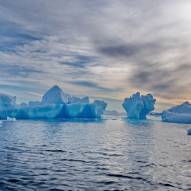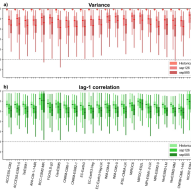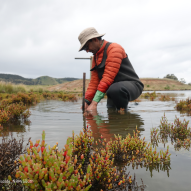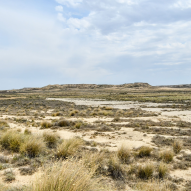 July 31, 2024 10:52 am
Published by Climate Extremes
July 31, 2024 10:52 am
Published by Climate Extremes
The Southern Ocean plays a crucial role in the Earth's climate system, however its intricate dynamics remain poorly understood. Co-authored by over thirty Australian and New Zealand climate science experts, a new paper shows that cross-disciplinary collaboration and community building are important for solving the mysteries of the Southern Ocean’s dynamic climate systems.
 July 30, 2024 11:32 am
Published by Climate Extremes
July 30, 2024 11:32 am
Published by Climate Extremes
In 2015, world leaders of 195 nations agreed to limit global warming to well below 2°C above pre-industrial levels and to pursue efforts to limit the temperature increase even further to 1.5°C. While this year-long exceedance of 1.5°C doesn’t break the commitments made in the Paris Agreement, scientists warn that it does bring us closer to the red line.
 July 19, 2024 4:46 pm
Published by Climate Extremes
July 19, 2024 4:46 pm
Published by Climate Extremes
Current climate models struggle to accurately represent the Southern Ocean's climate dynamics due to biases related to aerosols and clouds. Tahereh Alinejadtabrizi is a climate scientist who is working on this research problem.
 July 15, 2024 11:34 am
Published by Climate Extremes
July 15, 2024 11:34 am
Published by Climate Extremes
Accurate projections of climate change and associated extreme events under differing emission scenarios are linked to realistic representations of the temporal variability of the atmosphere at a variety of time scales. A new paper by Shao et al. (2024) introduces a novel time variability correction method designed to diagnose and rectify variance errors across a range of time scales.
 July 12, 2024 11:49 am
Published by Climate Extremes
July 12, 2024 11:49 am
Published by Climate Extremes
Corals are particularly sensitive to weather conditions over the Great Barrier Reef. Researchers from the ARC Centre of Excellence for Climate Extremes have found that the Madden-Julian Oscillation and the El Niño-Southern Oscillation influence weather patterns over the region, contributing to the rising threat of coral bleaching.
 July 11, 2024 11:54 am
Published by Climate Extremes
July 11, 2024 11:54 am
Published by Climate Extremes
Ashley Huang, a passionate atmospheric scientist and an alumna of the ARC Centre of Excellence for Climate Extremes, is set to embark on her PhD at Cornell University. Here, we take a look at her career journey to date.
 June 18, 2024 2:18 pm
Published by Climate Extremes
June 18, 2024 2:18 pm
Published by Climate Extremes
In recent years, nature-based solutions have gained considerable attention as a means to reach net-zero targets and many governments and companies are incorporating them in their net-zero strategies. Some sectors strongly advocate for these solutions while others criticise them.
 June 14, 2024 11:26 am
Published by Climate Extremes
June 14, 2024 11:26 am
Published by Climate Extremes
With climate change increasing the frequency and severity of bushfire weather, climate scientists warn that Australia could face bushfires that are even more devastating than the 2019/20 Black Summer bushfires.
 June 12, 2024 5:07 pm
Published by Climate Extremes
June 12, 2024 5:07 pm
Published by Climate Extremes
Climate scientists have found that the increase in aridity in drylands in response to climate change won't lead to a general loss of vegetation productivity. Instead, most of the global drylands are projected to become greener and more productive with climate change.
 June 3, 2024 3:00 pm
Published by Climate Extremes
June 3, 2024 3:00 pm
Published by Climate Extremes
Aditya Sengupta is a PhD researcher at the ARC Centre of Excellence for Climate Extremes studying the impacts of climate change on El Niño. After studying physics in India, and driven by the desire to make a change, Aditya decided to shift to climate science.










